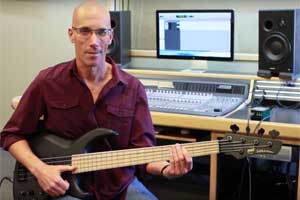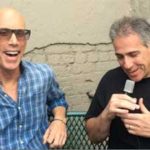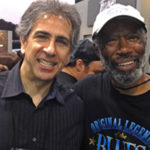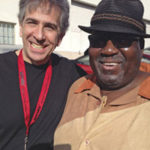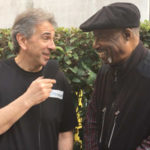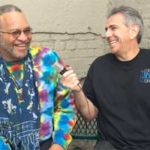Bass Chair at prestigious LAMA school goes one-on-one with FBPO, talking about his illustrious career – with a few good stories, too!
Exclusive interview with FBPO’s Jon Liebman
April 8, 2013
Since arriving in Los Angeles in 1980, Jerry Watts, Jr.has appeared on hundreds of CDs, as well as numerous DVDs and film/TV soundtracks. He has also done extensive international touring to more than forty countries. Jerry’s eclectic resume lists recordings and performances with a diverse list of artists, cutting across many genres of music. The list includes: Andy Summers, Herbie Hancock, Peter Cetera, Andy Timmons, Billy Idol, Dori Caymmi, Ginger Baker, Keith Emerson, Airto Moreira, Wishful Thinking, Mylène Farmer, Dave Stewart, Billy Childs, Tommy Walker, Sergio Mendes, Simon Phillips and countless others.
Watts is a member of the John Daversa Progressive Big Band and the Daversa Small Group. For the past seven years, he has served as Bass Department Chair at the prestigious LAMA College for Music Professionals in Pasadena, CA.
FBPO: How would you describe your musical upbringing?
JW: At age 7, I started on – what else? – accordion! Great instrument, but bad way to meet girls. After that, I dabbled with violin and then began guitar. There was always one around the house and I gravitated towards it.
FBPO: How did you become a bass player?
JW: Typical story: I wound up playing with a guy named Jef Scott, who played guitar. He was way better than me on guitar and we needed a bass player for our band. So, at 13, I picked up a bass.
FBPO: Who were your influences as a young bass player?
JW: Well, certainly the usual suspects in the beginning: Paul, Jack Bruce, Jamerson, Larry Graham. I was constantly listening to the radio and was really influenced by all the pop and rock and soul going on at the time. In my later teens, it was Jaco, Paul Jackson, Gordon Edwards, Nate Watts, Rufus Reid and Buster Williams. That said, my number-one guy was Chris Squire. I remember learning all of the songs from Fragile, Yessongs, Topographic Oceans… I was hooked.
FBPO: Tell me about your experience at William Paterson University. Who did you study with there?
JW: Great experience for me. At the time, Thad Jones and Mel Lewis were co-heads of the Jazz/Commercial music program, so all the students were exposed to their music and philosophy. Rufus Reid and, sometimes, George Mraz would be around and I soaked it all up. We used to go see the Thad/Mel Big Band at The Village Vanguard on Monday nights – Lots of music going on. It all had a profound influence on my musical outlook. My teacher there was Ron Naspo, who played upright and electric bass, as well as guitar. He’s an incredible teacher and his open-minded approach – and patience! – really helped shape the musician I am today. Also, I studied on and off for a couple years with NYC bass legend Jay Leonhart.
FBPO How about Cal State Northridge?
JW: Also a positive. At Paterson, I was allowed to be an “Electric Bass Major.” At Northridge, this wasn’t possible, so I switched to acoustic bass. I had a number of great teachers – Abe Luboff, Dennis Trembly, David Young and Ed Mears. I got to play a lot of the standard orchestral repertoire, some New Music stuff and also played in the jazz band, which was rated one of the top in the country – and where I got away with playing electric. There was a lot of pressure to “bring it.” I credit CSUN with helping me develop a very serious and professional approach, which serves me to this day.
FBPO: What prompted you to pick up and move all the way across the country to L.A?
JW: I can tell you’ve never been to New Jersey! [Laughs] Seriously, it was time for a change and taking that leap of faith altered the path of my life for the better.
FBPO: At what point did you career really begin to take off?
JW: Well, I did my first paying gig at 13 and from that point was pretty much always working. As far as getting some notice, I guess it was around ’84. During that time I did my first “legit” record with Prog Rock keyboard whiz Eddie Jobson, The Green Album. I started touring and recording with Indian violin legend L. Subramaniam in a band that featured Larry Coryell and Tony Williams. Then I joined the band Wishful Thinking, with funk drum legend David Garibaldi.
FBPO: You’ve performed with so many high-profile artists in so many countries around the world. You must have a good “road story” or an experience that really stands out.
JW: Here’s an odd one: Back in ’96, I was doing an arena tour in Europe with French superstar Mylène Farmer. They had hired a great band from L.A., that included the great Brian Ray. The front of the stage was fitted with a sort of extension ramp that allowed Mylène to walk out over the audience a bit. One time, at the very end of a show, she walked out on the ramp, and, in front of 20,000 people, the whole thing just collapsed! Needless to say, it was complete chaos for a few anxiety-filled minutes. In the moment, I didn’t think Mylène could have possibly survived the fall. Miraculously, she suffered only a broken wrist and nobody in the audience was injured. Definitely one of the more interesting moments on stage I’ve ever experienced.
FBPO: Tell me about the bass program at LAMA College for Music Professionals. How does it differ from the bass programs at other schools?
JW: Well, we feature a year and-a-half AA degree, which is a concentrated, focused program for the electric player and the doubler. Our primary goal is to prepare students to play and function successfully in the “real world” in whatever musical setting they aspire to. The class sizes are small enough for us to get to know each individual student and monitor their development as players. It’s all about relationships.
The entire bass faculty – Tim Landers, Mark Browne, Kevin Axt, Philip Bynoe, Steve Billman, Doug Ross, David Levray, Tom Witt and drummer Joey Heredia – are all gifted teachers and accomplished, successful pros. They bring their knowledge and insight and experience into the classroom, which is a great benefit to young players looking for the inside scoop on what it really takes.
In addition, being in L.A. allows us access to all types of visiting faculty, who come weekly to share their unique points of view. Recent master class instructors included guys like Janek Gwizdala, Bryan Beller, Norm Stockton and Mike Merritt, as well as visits from folks like pickup whiz/luthier Carey Nordstrand and studio drummer Russ Miller. The school has an Artist-In-Residence program which affords students access to some amazing bass legends like Lee Sklar, Abraham Laboriel Sr., Juan Alderete and Andrew Gouche. For the serious student, I can’t think of a place to study that offers such amazing proximity the musical world and the people in it.
FBPO: You must be excited about LAMA’s new partnership with Aguilar.
JW: Absolutely! Aguilar, of course, makes really great gear, which is a major step up in sound quality and reliability. Partnering with Aguilar is a great fit for the school, thanks to Dave Avenius, Dave Boonshoft and Justin Huth. We’re looking forward to sponsoring a lot more Aguilar artists at the school. An “All-Aguilar” bass event is in the works.
FBPO: How else will this new affiliation benefit your students?
JW: Better tone, better tone, better tone.
FBPO: What else is keeping your busy these days?
JW: Oh, recording quite a bit. I do tracks for people at my own studio and still get out to different studios around town. Recently, I played on the soundtrack for the upcoming documentary Kunta Kinteh Island by filmmaker Elvin Ross, on the pilot episode of the CBS show Vegas and quite a few sessions for overseas clients.
I’m always busy playing and exploring creative music and looking for new ways to stretch. For the last five years, I’ve had the honor of playing and recording with the amazing John Daversa in both his bands, as well as playing with Katisse Buckingham, Billy Childs/Joey Heredia Band, Mike Miller, Julia Helene, Arnold McCuller, the L. Subramaniam/Kavita Krishamurthy Global Ensemble and Brazilian master Dori Caymmi. Just before Christmas I spent a week tracking some tunes with vets David Kalish and the great Pete Thomas. This week, I finished tracking for uber-drummer Russ Miller’s upcoming CD.
FBPO: How about the future? What else would you like to do that you haven’t already accomplished?
JW: From my point of view, I’m just getting started. I hope a lot, lot more.
FBPO: What would you be if you weren’t a bass player?
JW: Well, if I couldn’t make the Olympic swim team, I would probably work for a faith-based NGO.
